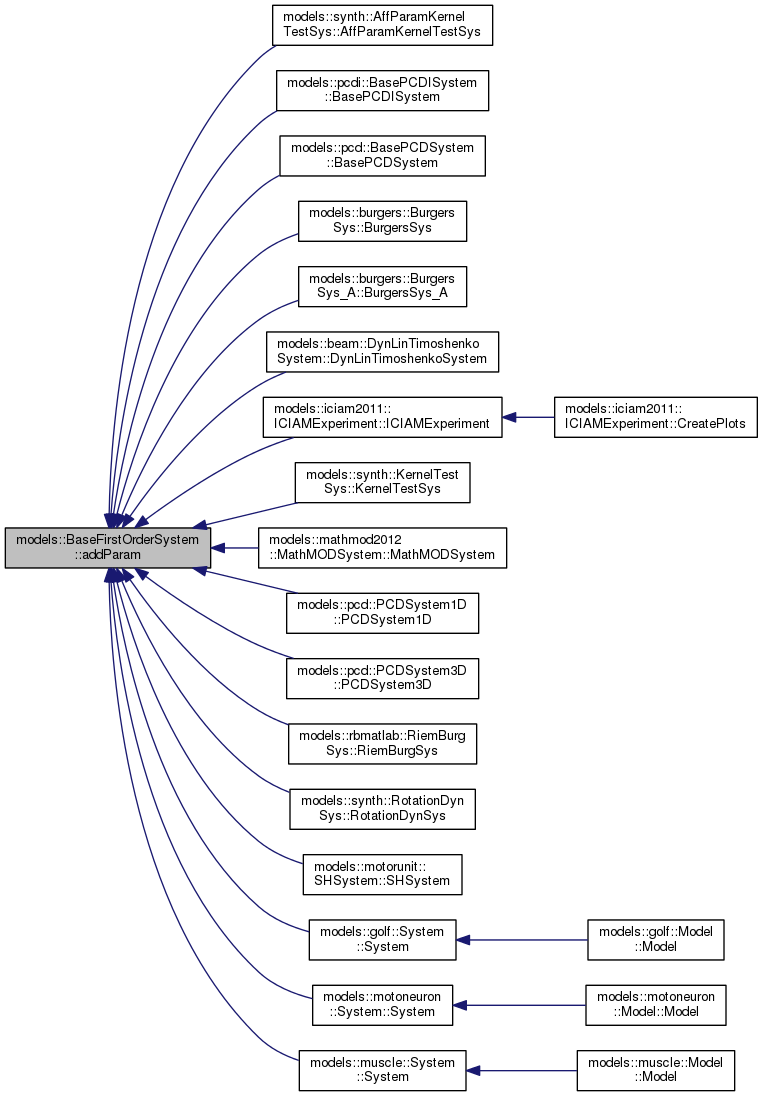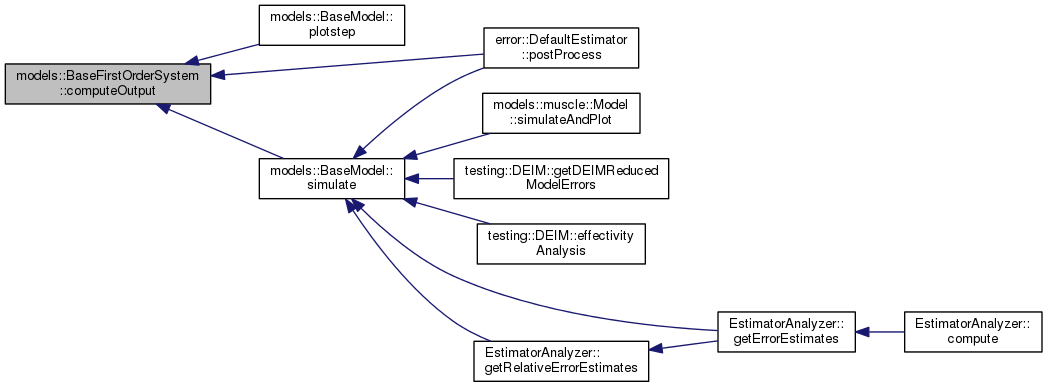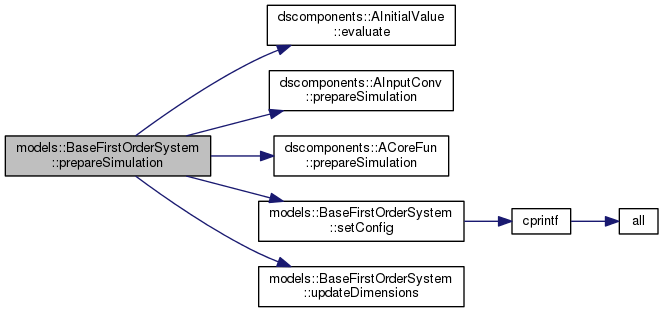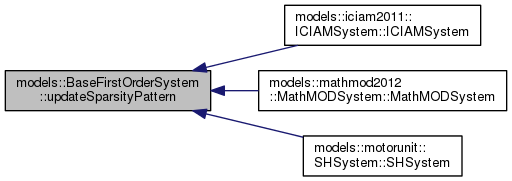 |
KerMor
0.9
Model order reduction for nonlinear dynamical systems and nonlinear approximation
|
 |
KerMor
0.9
Model order reduction for nonlinear dynamical systems and nonlinear approximation
|
Base class for all KerMor first-order dynamical systems. More...
Base class for all KerMor first-order dynamical systems.
To setup custom dynamical systems, inherit from this class.
No system components are set by default, except a scalar dscomponents.LinearOutputConv instance for simple state-space to output forwarding.
s instance to the ACoreFun implementing classes constructor and read settings from that instead. For an example see the models.pcd.PCDSystem2D and pcd.CoreFun2D.getODEFun function and replaced it by a direct implementation ODEFun. This enables to avoid nested function handles with in turn allow for a speedup of reduced simulations by almost a factor of 2.This class is part of the framework
Homepage http://www.morepas.org/software/index.htmlDocumentation http://www.morepas.org/software/kermor/index.htmlLicense KerMor license conditions Definition at line 18 of file BaseFirstOrderSystem.m.
Public Member Functions | |
| BaseFirstOrderSystem (models.BaseFullModel model) | |
| Creates a new base dynamical system class instance. More... | |
| function rsys = | getReducedSystemInstance (models.ReducedModel rmodel) |
| Creates a reduced system given the current system and the reduced model. More... | |
| function | setConfig (mu, inputidx) |
| Sets the dynamical system's configuration. More... | |
| function | prepareSimulation (colvec< double > mu,integer inputidx) |
| function dx = | ODEFun (double t,colvec< double > x) |
| Debug variant for single evaluation. Commented in function above. More... | |
| function y = | computeOutput (matrix< double > x,colvec< double > mu) |
| Computes the output \(y(t) = C(t,\mu)Sx(t)\) from a given state result vector \(x(t)\), using the system's time and current mu (if given). More... | |
| function | updateSparsityPattern () |
| function J = | getJacobian (double t, xc) |
| Computes the global jacobian of the current system. More... | |
| function matrix < double > x0 = | getX0 (rowvec< double > mu) |
| Gets the initial state variable at \(t=0\). More... | |
| function M = | getMassMatrix () |
| For first order systems, only algebraic constraints need to be catered for. More... | |
| function ModelParam p = | addParam (char name, default, varargin) |
| Adds a parameter with the given values to the parameter collection of the current dynamical system. More... | |
| function pidx = | getParamIndexFromName (paramname) |
| Gets the index within the parameter vector \(\mu\) for a given parameter name. More... | |
| function pt = | getParamInfo (colvec< double > mu) |
| function | plotInputs (pm) |
 Public Member Functions inherited from KerMorObject Public Member Functions inherited from KerMorObject | |
| KerMorObject () | |
| Constructs a new KerMor object. More... | |
| function | display () |
| disp(object2str(this)); More... | |
| function bool = | eq (B) |
| Checks equality of two KerMor objects. More... | |
| function bool = | ne (B) |
| Checks if two KerMorObjects are different. More... | |
| function cn = | getClassName () |
| Returns the simple class name of this object without packages. More... | |
 Public Member Functions inherited from DPCMObject Public Member Functions inherited from DPCMObject | |
| DPCMObject () | |
| Creates a new DPCM object. More... | |
| DPCMObject () | |
Public Attributes | |
| dscomponents.ACoreFun | f |
| The core f function from the dynamical system. More... | |
| dscomponents.LinearCoreFun | A = "[]" |
| Represents a linear or affine-linear component of the dynamical system. More... | |
| dscomponents.AInputConv | B = "[]" |
| The input conversion. More... | |
| dscomponents.LinearOutputConv | C |
| The output conversion Defaults to an LinearOutputConv instance using a 1-matrix, which just forwards the state variables and supports projection. More... | |
| dscomponents.AInitialValue | x0 = "[]" |
| Function handle to initial state evaluation. More... | |
| dscomponents.AMassMatrix | M = "[]" |
| The system's mass matrix. More... | |
| dscomponents.ACoreFun | g = "[]" |
| The system's algebraic constraints function. More... | |
| Inputs = {""} | |
| The system's possible input functions. A cell array of function handles, each taking a time argument t. More... | |
| Params = data.ModelParam.empty | |
| The parameters usable for the dynamical system. More... | |
| integer | DependentParamIndices = -1 |
| Indices of the parameter vector that are effectively used in the system's core function. More... | |
| double | MaxTimestep = "[]" |
| The maximum timestep allowed for any ODE solvers. More... | |
| colvec | StateScaling = 1 |
| The scaling for the state vectors. More... | |
| SparsityPattern | |
| The global sparsity pattern for the entire RHS. More... | |
| mu = "[]" | |
| The current parameter \(\mu\) for simulations, [] is none used. More... | |
| u = "[]" | |
| The current input function \(u(t)\) as function handle, [] if none used. More... | |
| inputidx = "[]" | |
| The current inputindex of the function \(u(t)\). More... | |
| NumStateDofs = "[]" | |
| NumAlgebraicDofs = 0 | |
| NumTotalDofs = "[]" | |
| InputCount | |
| The number of inputs available. More... | |
| ParamCount | |
| The number of the system's parameters. More... | |
| Model | |
| The Model this System is attached to. More... | |
 Public Attributes inherited from DPCMObject Public Attributes inherited from DPCMObject | |
| WorkspaceVariableName = "" | |
| The workspace variable name of this class. Optional. More... | |
| ID = "[]" | |
| An ID that allows to uniquely identify this DPCMObject (at least within the current MatLab session/context). More... | |
| PropertiesChanged = "[]" | |
| The Dictionary containing all the property settings as key/value pairs. More... | |
 Public Attributes inherited from handle Public Attributes inherited from handle | |
| addlistener | |
| Creates a listener for the specified event and assigns a callback function to execute when the event occurs. More... | |
| notify | |
| Broadcast a notice that a specific event is occurring on a specified handle object or array of handle objects. More... | |
| delete | |
| Handle object destructor method that is called when the object's lifecycle ends. More... | |
| disp | |
| Handle object disp method which is called by the display method. See the MATLAB disp function. More... | |
| display | |
| Handle object display method called when MATLAB software interprets an expression returning a handle object that is not terminated by a semicolon. See the MATLAB display function. More... | |
| findobj | |
| Finds objects matching the specified conditions from the input array of handle objects. More... | |
| findprop | |
| Returns a meta.property objects associated with the specified property name. More... | |
| fields | |
| Returns a cell array of string containing the names of public properties. More... | |
| fieldnames | |
| Returns a cell array of string containing the names of public properties. See the MATLAB fieldnames function. More... | |
| isvalid | |
| Returns a logical array in which elements are true if the corresponding elements in the input array are valid handles. This method is Sealed so you cannot override it in a handle subclass. More... | |
| eq | |
| Relational functions example. See details for more information. More... | |
| transpose | |
| Transposes the elements of the handle object array. More... | |
| permute | |
| Rearranges the dimensions of the handle object array. See the MATLAB permute function. More... | |
| reshape | |
| hanges the dimensions of the handle object array to the specified dimensions. See the MATLAB reshape function. More... | |
| sort | |
| ort the handle objects in any array in ascending or descending order. More... | |
Protected Member Functions | |
| function | updateDimensions () |
| function ad_ic = | getAlgebraicDofsInitialConditions () |
| The default is to return all zeros. More... | |
| function | validateModel (models.BaseFullModel model) |
| Validates if the model to be set is a valid BaseModel at least. Extracting this function out of the setter enables subclasses to further restrict the objects that may be passed, as is being done in models.ReducedSystem, for example. More... | |
 Protected Member Functions inherited from KerMorObject Protected Member Functions inherited from KerMorObject | |
| function | checkType (obj, type) |
| Object typechecker. More... | |
 Protected Member Functions inherited from DPCMObject Protected Member Functions inherited from DPCMObject | |
| function | registerProps (varargin) |
| Call this method at any class that defines DPCM observed properties. More... | |
| function | registerProps (varargin) |
Additional Inherited Members | |
 Static Protected Member Functions inherited from DPCMObject Static Protected Member Functions inherited from DPCMObject | |
| static function obj = | loadobj (obj, from) |
| Re-register any registered change listeners! More... | |
| static function obj = | loadobj (obj, from) |
| models.BaseFirstOrderSystem.BaseFirstOrderSystem | ( | models.BaseFullModel | model | ) |
Creates a new base dynamical system class instance.
Uses default output mapping: state variables are output.
| model | A KerMor full model |
Definition at line 415 of file BaseFirstOrderSystem.m.
References C, dscomponents.LinearOutputConv.LinearOutputConv(), Model, DPCMObject.registerProps(), and validateModel().
Referenced by models.BaseFullModel.BaseFullModel().


| function ModelParam p = models.BaseFirstOrderSystem.addParam | ( | char | name, |
| default, | |||
| varargin | |||
| ) |
Adds a parameter with the given values to the parameter collection of the current dynamical system.
Use in subclass constructors to easily define desired default parameters for a specific dynamical system.
| name | The name of the Parameter |
| varargin | code addParam ( ..., range, desired, spacing ) Required Parameters for varargin:
|
| p | The new ModelParam instance. |
Definition at line 687 of file BaseFirstOrderSystem.m.
References Params.
Referenced by models.synth.AffParamKernelTestSys.AffParamKernelTestSys(), models.pcdi.BasePCDISystem.BasePCDISystem(), models.pcd.BasePCDSystem.BasePCDSystem(), models.burgers.BurgersSys.BurgersSys(), models.burgers.BurgersSys_A.BurgersSys_A(), models.beam.DynLinTimoshenkoSystem.DynLinTimoshenkoSystem(), models.iciam2011.ICIAMExperiment.ICIAMExperiment(), models.synth.KernelTestSys.KernelTestSys(), models.mathmod2012.MathMODSystem.MathMODSystem(), models.pcd.PCDSystem1D.PCDSystem1D(), models.pcd.PCDSystem3D.PCDSystem3D(), models.rbmatlab.RiemBurgSys.RiemBurgSys(), models.synth.RotationDynSys.RotationDynSys(), models.motorunit.SHSystem.SHSystem(), models.golf.System.System(), models.motoneuron.System.System(), and models.muscle.System.System().

Computes the output \(y(t) = C(t,\mu)Sx(t)\) from a given state result vector \(x(t)\), using the system's time and current mu (if given).
The matrix \(S\) represents possibly set state space scaling, and \(C(t,\mu)\) is an output conversion. Identity values are assumed if the corresponding components are not set/given.
NOTE: This is also called for reduced simulations within ReducedModel.simulate. However, reduced models do not employ state scaling anymore as it has been included in the x0, C components at build-time for the reduced model, respectively. Consequently, the StateScaling property of ReducedSystems is 1.
See models.ReducedSystem.setReducedModel
| x | The state variable vector at each time step per column |
| mu | The parameter to use. If not specified, the currently set \(\mu\) value of this system is used. Default: this.mu |
| y | The output according to \(y(t) = C(t,\mu)Sx(t)\) |
Definition at line 536 of file BaseFirstOrderSystem.m.
References C, dscomponents.LinearOutputConv.evaluate(), Model, mu, StateScaling, t, and dscomponents.AOutputConv.TimeDependent.
Referenced by models.BaseModel.plotstep(), error.DefaultEstimator.postProcess(), and models.BaseModel.simulate().


|
protected |
The default is to return all zeros.
Definition at line 776 of file BaseFirstOrderSystem.m.
References NumAlgebraicDofs.
Referenced by getX0().

| function J = models.BaseFirstOrderSystem.getJacobian | ( | double | t, |
| xc | |||
| ) |
Computes the global jacobian of the current system.
| t | The current time(s) \(t \in [0, T]\) |
Definition at line 611 of file BaseFirstOrderSystem.m.
References A, f, g, dscomponents.LinearCoreFun.getStateJacobian(), dscomponents.ACoreFun.getStateJacobian(), NumStateDofs, and NumTotalDofs.

| function M = models.BaseFirstOrderSystem.getMassMatrix | ( | ) |
For first order systems, only algebraic constraints need to be catered for.
Definition at line 669 of file BaseFirstOrderSystem.m.
References M, NumAlgebraicDofs, and NumStateDofs.
| function pidx = models.BaseFirstOrderSystem.getParamIndexFromName | ( | paramname | ) |
Gets the index within the parameter vector \(\mu\) for a given parameter name.
| pidx | The parameter index for the given name, [] if none found. |
Definition at line 719 of file BaseFirstOrderSystem.m.
References Params.
Definition at line 734 of file BaseFirstOrderSystem.m.
References PrintTable.HasRowHeader, Model, mu, ParamCount, and Params.
| function rsys = models.BaseFirstOrderSystem.getReducedSystemInstance | ( | models.ReducedModel | rmodel | ) |
Creates a reduced system given the current system and the reduced model.
| rmodel | A KerMor reduced model |
Definition at line 433 of file BaseFirstOrderSystem.m.
Referenced by models.ReducedModel.build().

Gets the initial state variable at \(t=0\).
This is exported into an extra function as it gets overridden in the ReducedModel subclass, where ErrorEstimators possibly change the x0 dimension.
| mu | The parameter \(\mu\) to evaluate \(x_0(\mu)\). Use [] for none. Default: [] |
| x0 | the initial state for the parameter \(\mu\) |
Definition at line 641 of file BaseFirstOrderSystem.m.
References dscomponents.AInitialValue.evaluate(), getAlgebraicDofsInitialConditions(), NumAlgebraicDofs, StateScaling, and x0.

Debug variant for single evaluation. Commented in function above.
| t | The current time(s) \(t \in [0, T]\) |
| x | The state variable vector \(\vx(t)\) |
Definition at line 510 of file BaseFirstOrderSystem.m.
References A, B, dscomponents.AInputConv.evaluate(), dscomponents.LinearCoreFun.evaluate(), dscomponents.ACoreFun.evaluate(), f, g, inputidx, mu, NumTotalDofs, and u.

| function models.BaseFirstOrderSystem.plotInputs | ( | pm | ) |
Definition at line 753 of file BaseFirstOrderSystem.m.
References InputCount, Inputs, PlotManager.LeaveOpen, and Model.
Definition at line 484 of file BaseFirstOrderSystem.m.
References A, B, dscomponents.AInitialValue.evaluate(), f, NumStateDofs, dscomponents.AInputConv.prepareSimulation(), dscomponents.ACoreFun.prepareSimulation(), setConfig(), updateDimensions(), and x0.
Referenced by models.BaseModel.computeTrajectory(), and models.BaseModel.solveStatic().


| function models.BaseFirstOrderSystem.setConfig | ( | mu, | |
| inputidx | |||
| ) |
Sets the dynamical system's configuration.
With configuration are meant the parameter \(\mu\) and input \(u(t)\) that effectively results in a different dynamical system.
| mu | The current parameter \(\mu\in\P\). Must be a column vector of the same length as configured parameters. Leave empty if none are used. |
| inputidx | The index of the input function \(u(t)\) to use. Must be a valid index for one of the cell elements of the Inputs property. Leave empty of none are used. |
Definition at line 446 of file BaseFirstOrderSystem.m.
References cprintf(), inputidx, Inputs, mu, ParamCount, Params, t, and u.
Referenced by approx.TPWLApprox.approximateSystemFunction(), models.BaseFullModel.computeTrajectory(), models.muscle.ExperimentRunner.getCachedExperimentConfig(), models.BaseFullModel.getSimCacheTrajectory(), models.BaseFullModel.plotTrajectoryNr(), and prepareSimulation().


|
protected |
Definition at line 771 of file BaseFirstOrderSystem.m.
References NumAlgebraicDofs, NumStateDofs, and NumTotalDofs.
Referenced by models.synth.AffParamKernelTestSys.AffParamKernelTestSys(), models.iciam2011.ICIAMSystem.ICIAMSystem(), models.synth.KernelTestSys.KernelTestSys(), models.mathmod2012.MathMODSystem.MathMODSystem(), prepareSimulation(), models.circ.RCLadderSys.RCLadderSys(), models.synth.RotationDynSys.RotationDynSys(), models.motorunit.SHSystem.SHSystem(), models.motoneuron.System.System(), and models.wh10.WH10System.WH10System().

| function models.BaseFirstOrderSystem.updateSparsityPattern | ( | ) |
Definition at line 594 of file BaseFirstOrderSystem.m.
References A, f, g, dscomponents.ACoreFun.JSparsityPattern, NumStateDofs, NumTotalDofs, and SparsityPattern.
Referenced by models.iciam2011.ICIAMSystem.ICIAMSystem(), models.mathmod2012.MathMODSystem.MathMODSystem(), and models.motorunit.SHSystem.SHSystem().

|
protected |
Validates if the model to be set is a valid BaseModel at least. Extracting this function out of the setter enables subclasses to further restrict the objects that may be passed, as is being done in models.ReducedSystem, for example.
| model | A KerMor full model |
Definition at line 786 of file BaseFirstOrderSystem.m.
Referenced by BaseFirstOrderSystem().

| models.BaseFirstOrderSystem.A = "[]" |
Represents a linear or affine-linear component of the dynamical system.
If there is any linear part in your system, assign it here to take advantage of more involved solvers like semi-implicit euler.
Default: []
SetObservable set to true. Definition at line 101 of file BaseFirstOrderSystem.m.
Referenced by models.ReducedSystem.build(), models.beam.DynLinTimoshenkoSystem.buildElementDependentComponents(), spacereduction.PODGreedy.generateReducedSpaceImpl(), error.DEIMEstimator.getAlpha(), models.ReducedSecondOrderSystem.getJacobian(), models.BaseSecondOrderSystem.getJacobian(), getJacobian(), models.pcd.PCDSystem2D.newSysDimension(), models.pcd.PCDSystem1D.newSysDimension(), models.pcd.PCDSystem3D.newSysDimension(), models.pcdi.PCDISystem2D.newSysDimension(), models.BaseSecondOrderSystem.ODEFun(), ODEFun(), error.DEIMEstimator.offlineComputations(), prepareSimulation(), models.circ.RCLadderSys.RCLadderSys(), models.burgers.BurgersSys_A.updateDimensions(), models.BaseSecondOrderSystem.updateSparsityPattern(), updateSparsityPattern(), and error.DEIMEstimator.validModelForEstimator().
| models.BaseFirstOrderSystem.B = "[]" |
The input conversion.
Default: []
SetObservable set to true. Definition at line 121 of file BaseFirstOrderSystem.m.
Referenced by models.synth.AffParamKernelTestSys.AffParamKernelTestSys(), models.muscle.System.assembleB(), models.ReducedSystem.build(), models.beam.DynLinTimoshenkoSystem.buildElementDependentComponents(), models.muscle.System.configUpdated(), models.iciam2011.ICIAMExperiment.ICIAMExperiment(), error.alpha.Constant.inputOfflineComputations(), error.alpha.AffineParametric.inputOfflineComputations(), models.mathmod2012.MathMODExperiment.MathMODExperiment(), models.BaseSecondOrderSystem.ODEFun(), ODEFun(), models.BaseFullModel.off2_genTrainingData(), models.motoneuron.System.plot(), error.TPWLLocalLipEstimator.prepareForReducedModel(), error.BaseCompLemmaEstimator.prepareForReducedModel(), prepareSimulation(), models.circ.RCLadderSys.RCLadderSys(), models.rbmatlab.RiemBurgSys.RiemBurgSys(), models.motorunit.SHSystem.SHSystem(), models.motoneuron.System.System(), and error.DEIMEstimator.validModelForEstimator().
| models.BaseFirstOrderSystem.C |
The output conversion Defaults to an LinearOutputConv instance using a 1-matrix, which just forwards the state variables and supports projection.
Default: 1
SetObservable set to true. Definition at line 136 of file BaseFirstOrderSystem.m.
Referenced by BaseFirstOrderSystem(), models.ReducedSystem.build(), models.beam.DynLinTimoshenkoSystem.buildElementDependentComponents(), computeOutput(), models.iciam2011.ICIAMExperiment.ICIAMExperiment(), models.mathmod2012.MathMODExperiment.MathMODExperiment(), models.pcd.PCDSystem2D.newSysDimension(), models.pcd.PCDSystem3D.newSysDimension(), models.pcdi.PCDISystem2D.newSysDimension(), error.BaseEstimator.postProcess(), error.TPWLLocalLipEstimator.postProcess(), models.circ.RCLadderSys.RCLadderSys(), models.motorunit.SHSystem.SHSystem(), and error.TPWLLocalLipEstimator.validModelForEstimator().
| models.BaseFirstOrderSystem.DependentParamIndices = -1 |
Indices of the parameter vector that are effectively used in the system's core function.
Set this property to the list of indices whose values are actually used at the evaluation of the \(f\) function. Leaving it empty means none are used, and -1 means all values are used (default).
When building kernel expansion approximations this setting will be used to configure the parameter kernel of the kernels.ParamTimeKernelExpansion.
Default: -1
SetObservable set to true. Definition at line 238 of file BaseFirstOrderSystem.m.
Referenced by models.mathmod2012.MathMODSystem.MathMODSystem().
| models.BaseFirstOrderSystem.f |
The core f function from the dynamical system.
Default: []
SetObservable set to true. Definition at line 86 of file BaseFirstOrderSystem.m.
Referenced by models.synth.AffParamKernelTestSys.AffParamKernelTestSys(), approx.DEIM.approximateSystemFunction(), approx.KernelEI.approximateSystemFunction(), approx.TPWLApprox.approximateSystemFunction(), error.alpha.Base.Base(), models.ReducedSystem.build(), models.beam.DynLinTimoshenkoSystem.buildElementDependentComponents(), models.burgers.BurgersSys.BurgersSys(), models.burgers.BurgersSys_A.BurgersSys_A(), testing.DEIM.compareDEIM_Full_Jacobian(), testing.LogNorm.compareSimTransJac_FullJac(), approx.KernelEI.computeEmpiricalSparsityPattern(), models.muscle.Model.computeTrajectory(), models.BaseFullModel.computeTrajectory(), models.muscle.System.configUpdated(), error.BaseCompLemmaEstimator.evalODEPart(), error.TPWLLocalLipEstimator.evalODEPart(), spacereduction.Krylov.generateReducedSpaceImpl(), error.BaseCompLemmaEstimator.getAlpha(), error.DEIMEstimator.getAlpha(), error.IterationCompLemmaEstimator.getBeta(), error.DEIMEstimator.getBeta(), models.muscle.Model.getConfigTable(), testing.DEIM.getDEIMErrorsAtXForParams(), testing.DEIM.getDEIMReducedModelErrors(), models.ReducedSecondOrderSystem.getJacobian(), models.BaseSecondOrderSystem.getJacobian(), getJacobian(), models.iciam2011.ICIAMExperiment.ICIAMExperiment(), models.iciam2011.ICIAMSystem.ICIAMSystem(), models.synth.KernelTestSys.KernelTestSys(), models.mathmod2012.MathMODExperiment.MathMODExperiment(), models.mathmod2012.MathMODSystem.MathMODSystem(), demos.RandomModelEstimatorAnalyzer.newCoeffs(), models.BaseSecondOrderSystem.ODEFun(), ODEFun(), models.BaseFullModel.off2_genTrainingData(), models.BaseFullModel.off4_genApproximationTrainData(), error.IterationCompLemmaEstimator.offlineComputations(), models.pcdi.PCDISystem2D.PCDISystem2D(), models.pcd.PCDSystem1D.PCDSystem1D(), models.pcd.PCDSystem2D.PCDSystem2D(), models.pcd.PCDSystem3D.PCDSystem3D(), models.muscle.Model.plotActivation(), models.muscle.Model.plotAnisotropicPressure(), models.muscle.Model.plotForceLengthCurve(), models.motorunit.Shorten.plotMotoSacroLinkFactorCurve(), error.TPWLLocalLipEstimator.prepareForReducedModel(), error.IterationCompLemmaEstimator.prepareForReducedModel(), error.DEIMEstimator.prepareForReducedModel(), prepareSimulation(), models.circ.RCLadderSys.RCLadderSys(), models.rbmatlab.RiemBurgSys.RiemBurgSys(), models.synth.RotationDynSys.RotationDynSys(), demos.RandomModelEstimatorAnalyzer.setup(), models.motorunit.SHSystem.SHSystem(), models.motorunit.SHSystem.singlePeakModeOutputFcn(), models.golf.System.System(), models.motoneuron.System.System(), models.muscle.System.System(), models.burgers.BurgersSys.updateDimensions(), models.burgers.BurgersSys_A.updateDimensions(), models.pcd.BasePCDSystem.updateDimensions(), models.pcdi.BasePCDISystem.updateDimensions(), models.BaseSecondOrderSystem.updateSparsityPattern(), updateSparsityPattern(), error.GLEstimator.validModelForEstimator(), error.IterationCompLemmaEstimator.validModelForEstimator(), and models.wh10.WH10System.WH10System().
| models.BaseFirstOrderSystem.g = "[]" |
The system's algebraic constraints function.
Default: []
SetObservable set to true. Definition at line 191 of file BaseFirstOrderSystem.m.
Referenced by models.muscle.System.assembleDampingMatrix(), models.muscle.System.assembleMassMatrix(), models.ReducedSystem.build(), models.muscle.System.configUpdated(), models.ReducedSecondOrderSystem.getJacobian(), models.BaseSecondOrderSystem.getJacobian(), getJacobian(), models.muscle.System.initMuscleTendonRatios(), models.BaseSecondOrderSystem.ODEFun(), ODEFun(), models.muscle.System.System(), models.muscle.System.test_UnassembledEvaluation(), models.BaseSecondOrderSystem.updateSparsityPattern(), and updateSparsityPattern().
| models.BaseFirstOrderSystem.InputCount |
The number of inputs available.
Dependent set to true. SetAccess = Private, GetAccess = Public Definition at line 376 of file BaseFirstOrderSystem.m.
Referenced by models.beam.DynLinTimoshenkoModel.DynLinTimoshenkoModel(), models.BaseModel.plotInputs(), and plotInputs().
| models.BaseFirstOrderSystem.inputidx = "[]" |
The current inputindex of the function \(u(t)\).
Transient set to true. SetAccess = Protected, GetAccess = Public Definition at line 352 of file BaseFirstOrderSystem.m.
Referenced by models.BaseSecondOrderSystem.ODEFun(), ODEFun(), and setConfig().
| models.BaseFirstOrderSystem.Inputs = {""} |
The system's possible input functions. A cell array of function handles, each taking a time argument t.
SetObservable set to true. Definition at line 204 of file BaseFirstOrderSystem.m.
Referenced by models.synth.AffParamKernelTestSys.AffParamKernelTestSys(), models.ReducedSystem.build(), models.muscle.System.configUpdated(), models.beam.DynLinTimoshenkoSystem.DynLinTimoshenkoSystem(), models.iciam2011.ICIAMExperiment.ICIAMExperiment(), models.mathmod2012.MathMODExperiment.MathMODExperiment(), models.BaseModel.plotInputs(), plotInputs(), models.circ.RCLadderSys.RCLadderSys(), models.rbmatlab.RiemBurgSys.RiemBurgSys(), setConfig(), models.motorunit.SHSystem.SHSystem(), and models.motoneuron.System.System().
| models.BaseFirstOrderSystem.M = "[]" |
The system's mass matrix.
Default: []
SetObservable set to true. Definition at line 178 of file BaseFirstOrderSystem.m.
Referenced by models.ReducedSystem.build(), models.beam.DynLinTimoshenkoSystem.buildElementDependentComponents(), models.muscle.System.configUpdated(), models.BaseSecondOrderSystem.getMassMatrix(), getMassMatrix(), and models.pcdi.PCDISystem2D.newSysDimension().
| models.BaseFirstOrderSystem.MaxTimestep = "[]" |
The maximum timestep allowed for any ODE solvers.
This might be necessary if the Core function encapsulates a spatial discretization and thus CFL conditions apply, for example.
SetObservable set to true. Definition at line 266 of file BaseFirstOrderSystem.m.
Referenced by models.synth.AffParamKernelTestSys.AffParamKernelTestSys(), models.ReducedSystem.build(), models.burgers.Burgers.Burgers(), models.BaseModel.computeTrajectory(), models.beam.DynLinTimoshenkoSystem.DynLinTimoshenkoSystem(), models.iciam2011.ICIAMSystem.ICIAMSystem(), models.synth.KernelTest.KernelTest(), models.synth.KernelTestSys.KernelTestSys(), models.mathmod2012.MathMODExperiment.MathMODExperiment(), models.mathmod2012.MathMODSystem.MathMODSystem(), models.muscle.Model.Model(), models.golf.System.prepareSimulation(), models.circ.RCLadderSys.RCLadderSys(), models.motoneuron.System.setConfig(), models.motorunit.SHSystem.setConfig(), models.wh10.WH10Experiment.WH10Experiment(), and models.wh10.WH10System.WH10System().
| models.BaseFirstOrderSystem.Model |
The Model this System is attached to.
SetAccess = Private, GetAccess = Public Definition at line 402 of file BaseFirstOrderSystem.m.
Referenced by models.pcd.BaseCoreFun.activationFun(), models.synth.AffParamKernelTestSys.AffParamKernelTestSys(), BaseFirstOrderSystem(), models.pcdi.BasePCDISystem.BasePCDISystem(), models.pcd.BasePCDSystem.BasePCDSystem(), models.ReducedSecondOrderSystem.build(), models.ReducedSystem.build(), models.beam.DynLinTimoshenkoSystem.buildElementDependentComponents(), approx.KernelEI.computeEmpiricalSparsityPattern(), computeOutput(), models.beam.DLTNonlinearCoreFun.DLTNonlinearCoreFun(), models.golf.Force.evaluate(), models.pcd.CoreFun1D.evaluate(), models.pcd.CoreFun1D.evaluateComponentsMulti(), models.pcd.CoreFun1D.evaluateMulti(), models.ReducedSystem.getJacobian(), getParamInfo(), models.rbmatlab.RiemBurgSys.getx0(), models.ReducedSecondOrderSystem.getX0(), models.ReducedSystem.getX0(), models.synth.KernelTestSys.KernelTestSys(), models.burgers.BurgersF_NoA.newDim(), models.burgers.BurgersF.newDim(), models.pcdi.PCDISystem2D.newSysDimension(), models.ReducedSecondOrderSystem.ODEFun(), models.ReducedSystem.ODEFun(), models.pcdi.PCDISystem2D.PCDISystem2D(), models.pcd.PCDSystem1D.PCDSystem1D(), models.pcd.PCDSystem2D.PCDSystem2D(), models.pcd.PCDSystem3D.PCDSystem3D(), models.pcd.PCDSystem1D.plot(), models.pcd.BaseCoreFun.plotActivationFun(), models.pcdi.BaseCoreFun.plotActivationFun(), models.pcdi.PCDISystem2D.plotDiffusionCoeff(), plotInputs(), models.motoneuron.Dynamics.prepareSimulation(), models.golf.System.prepareSimulation(), models.circ.RCLadderSys.RCLadderSys(), models.motorunit.SHSystem.setConfig(), models.pcd.BasePCDSystem.setConfig(), models.synth.KernelTestFun.showBaseFun(), models.muscle.Dynamics.test_Jacobian(), models.burgers.BurgersSys.updateDimensions(), models.burgers.BurgersSys_A.updateDimensions(), and models.ReducedSystem.updateDimensions().
| models.BaseFirstOrderSystem.mu = "[]" |
The current parameter \(\mu\) for simulations, [] is none used.
Transient set to true. SetAccess = Protected, GetAccess = Public Definition at line 326 of file BaseFirstOrderSystem.m.
Referenced by computeOutput(), models.golf.System.getDerivativeInitialValues(), getParamInfo(), models.golf.Model.initPlot(), models.golf.Model.ODE_Callback(), models.BaseSecondOrderSystem.ODEFun(), ODEFun(), models.motoneuron.System.plot(), models.motorunit.Shorten.plot(), models.pcdi.PCDISystem2D.plotDiffusionCoeff(), models.muscle.MusclePlotter.plotGeometry(), models.muscle.Model.plotGeometrySetup(), models.motorunit.Shorten.plotState(), models.motoneuron.System.prepareSimulation(), models.motorunit.SHSystem.prepareSimulation(), models.muscle.System.prepareSimulation(), models.rbmatlab.RiemBurgSys.RiemBurgSys(), models.motoneuron.System.setConfig(), models.motorunit.SHSystem.setConfig(), setConfig(), and models.muscle.Model.setGaussIntegrationRule().
| models.BaseFirstOrderSystem.NumAlgebraicDofs = 0 |
Definition at line 369 of file BaseFirstOrderSystem.m.
Referenced by models.ReducedSecondOrderSystem.compileReconstructionMatrix(), getAlgebraicDofsInitialConditions(), models.ReducedSecondOrderSystem.getJacobian(), models.BaseSecondOrderSystem.getJacobian(), models.BaseSecondOrderSystem.getMassMatrix(), getMassMatrix(), getX0(), models.BaseFullModel.off3_computeReducedSpace(), models.ReducedSecondOrderSystem.updateDimensions(), models.BaseSecondOrderSystem.updateDimensions(), models.ReducedSystem.updateDimensions(), updateDimensions(), models.muscle.System.updateDimensions(), and models.BaseSecondOrderSystem.updateSparsityPattern().
| models.BaseFirstOrderSystem.NumStateDofs = "[]" |
Definition at line 367 of file BaseFirstOrderSystem.m.
Referenced by models.synth.AffParamKernelTestSys.AffParamKernelTestSys(), models.beam.DynLinTimoshenkoSystem.buildElementDependentComponents(), models.ReducedSecondOrderSystem.getJacobian(), models.BaseSecondOrderSystem.getJacobian(), getJacobian(), models.BaseSecondOrderSystem.getMassMatrix(), getMassMatrix(), models.ReducedSecondOrderSystem.getX0(), models.BaseSecondOrderSystem.getX0(), models.iciam2011.ICIAMSystem.ICIAMSystem(), models.synth.KernelTestSys.KernelTestSys(), models.mathmod2012.MathMODSystem.MathMODSystem(), models.pcdi.PCDISystem2D.newSysDimension(), models.BaseSecondOrderSystem.ODEFun(), prepareSimulation(), models.circ.RCLadderSys.RCLadderSys(), models.synth.RotationDynSys.RotationDynSys(), models.motorunit.SHSystem.SHSystem(), models.golf.System.System(), models.motoneuron.System.System(), models.burgers.BurgersSys.updateDimensions(), models.burgers.BurgersSys_A.updateDimensions(), models.ReducedSecondOrderSystem.updateDimensions(), models.pcd.BasePCDSystem.updateDimensions(), models.pcdi.BasePCDISystem.updateDimensions(), models.BaseSecondOrderSystem.updateDimensions(), models.ReducedSystem.updateDimensions(), updateDimensions(), models.muscle.System.updateDimensions(), models.BaseSecondOrderSystem.updateSparsityPattern(), updateSparsityPattern(), and models.wh10.WH10System.WH10System().
| models.BaseFirstOrderSystem.NumTotalDofs = "[]" |
Definition at line 371 of file BaseFirstOrderSystem.m.
Referenced by models.BaseFullModel.assembleProjectionMatrices(), models.ReducedSecondOrderSystem.getJacobian(), models.BaseSecondOrderSystem.getJacobian(), getJacobian(), models.ReducedSecondOrderSystem.getX0(), models.BaseSecondOrderSystem.getX0(), ODEFun(), models.BaseFullModel.off3_computeReducedSpace(), models.ReducedSecondOrderSystem.updateDimensions(), models.BaseSecondOrderSystem.updateDimensions(), models.ReducedSystem.updateDimensions(), updateDimensions(), models.BaseSecondOrderSystem.updateSparsityPattern(), and updateSparsityPattern().
| models.BaseFirstOrderSystem.ParamCount |
The number of the system's parameters.
Dependent set to true. SetAccess = Private, GetAccess = Public Definition at line 388 of file BaseFirstOrderSystem.m.
Referenced by sampling.BaseSampler.generateSamples(), getParamInfo(), models.BaseModel.initDefaultParameter(), models.mathmod2012.MathMODSystem.MathMODSystem(), models.BaseFullModel.off1_createParamSamples(), and setConfig().
| models.BaseFirstOrderSystem.Params = data.ModelParam.empty |
The parameters usable for the dynamical system.
SetObservable set to true. Definition at line 224 of file BaseFirstOrderSystem.m.
Referenced by addParam(), models.ReducedSystem.build(), testing.LogNorm.getApproxLogNormsAtPos(), getParamIndexFromName(), getParamInfo(), models.BaseModel.initDefaultParameter(), models.pcd.PCDSystem1D.PCDSystem1D(), and setConfig().
| models.BaseFirstOrderSystem.SparsityPattern |
The global sparsity pattern for the entire RHS.
SetObservable set to true. Definition at line 313 of file BaseFirstOrderSystem.m.
Referenced by models.BaseSecondOrderSystem.updateSparsityPattern(), models.ReducedSystem.updateSparsityPattern(), and updateSparsityPattern().
| models.BaseFirstOrderSystem.StateScaling = 1 |
The scaling for the state vectors.
Can either be a scalar that will be used for every \(f\)-dimension, or a vector of the same dimension as the system's core function \(f\) which will then be applied component-wise
See the Scaling of KerMor models documentation for more details.
SetObservable set to true. Definition at line 292 of file BaseFirstOrderSystem.m.
Referenced by models.pcdi.BasePCDISystem.BasePCDISystem(), models.ReducedSystem.build(), computeOutput(), EstimatorAnalyzer.getRelativeErrorEstimates(), getX0(), models.circ.RCLadderSys.RCLadderSys(), and models.pcd.BasePCDSystem.updateDimensions().
| models.BaseFirstOrderSystem.u = "[]" |
The current input function \(u(t)\) as function handle, [] if none used.
Transient set to true. SetAccess = Protected, GetAccess = Public Definition at line 339 of file BaseFirstOrderSystem.m.
Referenced by models.beam.DynLinTimoshenkoSystem.buildElementDependentComponents(), models.muscle.System.inita0(), models.ReducedSecondOrderSystem.ODEFun(), models.BaseSecondOrderSystem.ODEFun(), models.ReducedSystem.ODEFun(), ODEFun(), and setConfig().
| models.BaseFirstOrderSystem.x0 = "[]" |
Function handle to initial state evaluation.
The handle returns the initial value \(x(0) = x_0\) for the ODE solver to start simulations from.
Function parameter is the current parameter \(\mu\) and return value is initial system state \(x_0\).
Default: []
SetObservable set to true. Definition at line 155 of file BaseFirstOrderSystem.m.
Referenced by models.synth.AffParamKernelTestSys.AffParamKernelTestSys(), models.muscle.System.assembleX0(), models.ReducedSystem.build(), models.beam.DynLinTimoshenkoSystem.buildElementDependentComponents(), models.muscle.System.configUpdated(), spacereduction.Krylov.generateReducedSpaceImpl(), models.rbmatlab.RiemBurgSys.getx0(), models.ReducedSystem.getX0(), getX0(), models.iciam2011.ICIAMExperiment.ICIAMExperiment(), models.synth.KernelTestSys.KernelTestSys(), models.mathmod2012.MathMODExperiment.MathMODExperiment(), models.pcd.PCDSystem2D.newSysDimension(), models.pcd.PCDSystem1D.newSysDimension(), models.pcd.PCDSystem3D.newSysDimension(), models.pcdi.PCDISystem2D.newSysDimension(), error.BaseEstimator.offlineComputations(), models.muscle.System.plotDiff(), error.initial.Constant.prepareForReducedModel(), error.initial.AffineParametric.prepareForReducedModel(), prepareSimulation(), models.circ.RCLadderSys.RCLadderSys(), models.rbmatlab.RiemBurgSys.RiemBurgSys(), models.synth.RotationDynSys.RotationDynSys(), demos.RandomModelEstimatorAnalyzer.setup(), models.motorunit.SHSystem.SHSystem(), models.golf.System.System(), models.motoneuron.System.System(), models.burgers.BurgersSys.updateDimensions(), and models.burgers.BurgersSys_A.updateDimensions().